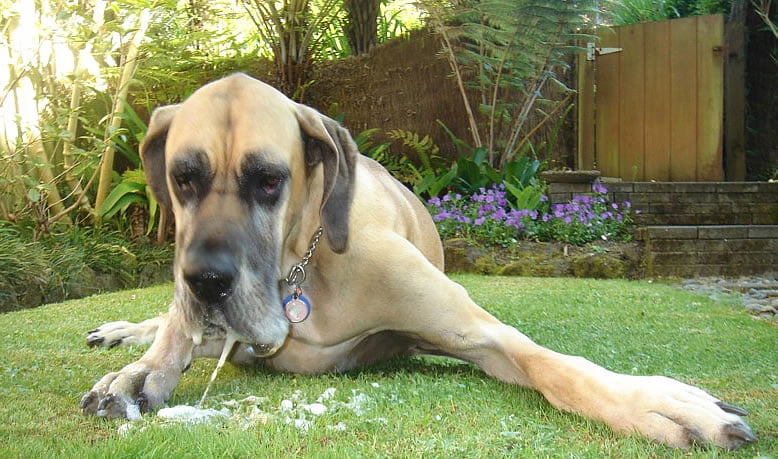Vomiting and diarrhoea are two of the most common problems seen by vets. Their causes are often trivial, but in some cases they can be life threatening. Knowing a little about the different types of vomiting will help you decide if your dog needs veterinary attention.
- Acute vomiting: dogs “cure” themselves of their scavenging indiscretions by vomiting back foods and foreign bodies that should not be in the stomach. Worms might also be removed this way. Acute vomiting also occurs as a result of motion sickness. With otherwise healthy dogs, simply withhold food and water for two hours after a single vomiting episode.
- Intermittent vomiting: this may be caused by food allergies or more serious conditions, such as metabolic diseases, ulcers, or tumours. See your vet within two days if vomiting occurs intermittently over several days.
- Repeated vomiting: can result from a simple stomach irritation or a life-threatening obstruction, so warrants immediate veterinary attention. Cooked bones(especially chicken), and sticks are the most common culprits, so give Fido RAW bones and a BALL or KONK(dog toy).
- Projectile vomiting: often caused by an obstruction that prevents food from leaving the stomach or by neurological conditions that affect the brain’s control centre. See a vet the same day.
- Vomiting blood: suggests stomach or small intestine ulceration, poisoning, foreign bodies, tumours, or serious infection. See your vet the same day.
- Vomiting bile: this may be a form of mild allergy. Affected dogs vomit bile, often at the same time each day, but are otherwise healthy. Vomiting is usually controlled with anti-nausea drugs until any diet change is effective.
Treatment for vomiting dogs
Withhold food after the vomiting episode for 2-24 hours, depending upon the severity of the vomiting and the age and fitness of the individual.Regularly give the dog small amounts of water or ice cubes. Dissolving rehydration salts in the water is beneficial, and soda water can help to neutralize the build-up of acid in vomiting dogs. Reintroduce food gradually, starting with frequent, small portions of low-fat, low-protein, soft food. A good home-made diet is one part low-fat cottage cheese and two parts boiled rice. This avoids stretching the stomach and will help food pass into the intestines.
Regurgitating food
Regurgitation occurs when food in the oesophagus is expelled back almost effortlessly through the mouth. The most common cause is an enlarged oesophagus – likely to be diagnosed when pups move from milk to solid food. Affected dogs are treated with frequent, small, high-calorie meals. The meal is put on an elevated platform, allowing gravity to assist the food through the oesophagus. Drugs that stimulate the movement of food from the oesophagus to the stomach may also be used.
Bloat: a potentially life threatening condition
If your dog’s belly swells and it seems uncomfortable, see a vet immediately. Bloat (gastric dilatation-volvulus) is one of the most serious of all medical emergencies. The causes of this condition are not clear, although in young dogs, it may result from overeating. The dog’s stomach becomes bloated due to a build up of fluids and gas. This may be accompanied by drooling, retching, restless wandering, listlessness, signs of pain, and attempts to vomit; signs of shock develop fast. Urgent veterinary attention is required to release the trapped gas and treat the dog for shock. However, bloat is an acute condition and has a high fatality rate even for dogs that receive immediate surgical intervention. The risk of bloat runs in families: middle-aged individuals of large or giant breeds with deep, narrow chests are particularly at risk: these include the Great Dane, Weimaraner, Standard Poodle, Irish Wolfhound, Irish and Gordon Setters, and Doberman. To minimize the risk of bloat, limit water consumption for an hour before or after each meal. Give both water and food often but in small quantities, and prevent your dog from rolling or taking exercise after meals

Leave A Comment